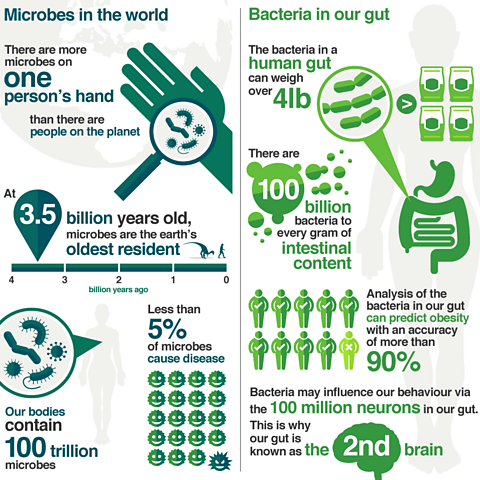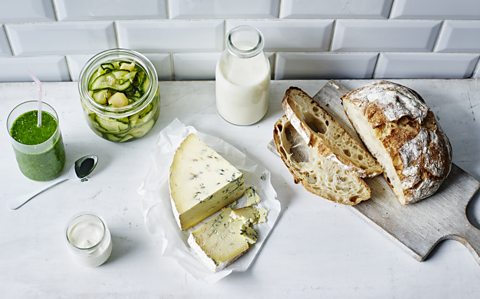What should I eat for a healthy gut?
Think bacteria are bad? Think again. Bacteria and other microbes (including fungi and viruses) are often thought of as sources of disease, but in fact many play an essential role in keeping you healthy. Your body contains trillions of microbes, most of which are beneficial. The most dense microbe population is in your gut, where they play a critical role in digestion, immune function and weight regulation. What you eat can quickly change your microbes, but are you eating the right foods to help your good gut bacteria?

Eating right for your microbes
What you eat isn't just nutrition for you, it also feeds the trillions of bacteria that live in your gut.
Every person is different, but if you want to improve your digestion, lose weight or look after your general health, there are some broad principles that apply to all.
Easy tips for gut health
- Eat a wide range of plant-based foods. A healthy gut has a diverse community of microbes, each of which prefers different foods.
- Eat more fibre. Most people eat less than they should. Fruit, vegetables, pulses, nuts and wholegrains feed healthy bacteria.
- Avoid highly processed foods. They often contain ingredients that either suppress 'good' bacteria or increase 'bad' bacteria.
- Probiotic foods, such as live yoghurt, might encourage more microbes to grow. Eat them if you enjoy them.
- Choose extra-virgin olive oil over other fats when you can. It contains the highest number of microbe-friendly polyphenols.
- Antibiotics kill тАШgoodтАЩ bacteria as well as тАШbadтАЩ. If you need antibiotics, make sure you eat lots of foods that boost your microbes afterwards.
- If your diet is low in fibre, a sudden increase can cause wind and bloating. This is less likely if you make gradual changes and drink extra water.
Probiotics vs prebiotics
Prebiotics are foods that тАШfertiliseтАЩ our existing gut bacteria and encourage the development of a diverse community of microbes. These foods are complex carbohydrates, such as vegetables and wholegrains. Probiotics are foods, or food supplements, that contain live bacteria thought to be beneficial to us. This includes live yoghurt, some cheeses and fermented foods.

The truth about тАШhealthy gutтАЩ foods
These popular foods are often claimed to benefit your gut тАУ but what's the truth?
- Probiotic supplements, including spirulina, might be helpful, but it hasn't been proven that the bacteria reach the gut intact. Some supplements have other well-established health benefits, but they tend to be expensive. Most probiotic supplements contain a limited array of microbes compared to what you can get from a good diet. Even if they do have health benefits, they are no substitute for eating a balanced diet.
- Fermented foods include sauerkraut, kimchi, miso, kombucha and many pickles. We canтАЩt be certain the bacteria they contain reach the gut, but in countries where this type of food is eaten frequently people appear to have better gut health and less bowel disease. However, other factors could be responsible. Fermented foods can be cheap and easy to make at home, so eat them if you enjoy them. Mass-produced pickles use vinegar instead of traditional methods of fermentation, so don't have the same benefits.
- Raw milk. The variety of microbes found in raw milk is very similar to pasteurised milk тАУ thereтАЩs just much more of them in raw milk. There is a strong correlation between drinking raw milk in childhood and a reduced incidence of allergies. This might be because of the high numbers of microbes in raw milk, but we can't be sure. Children who drink raw milk often live on farms, which also bring microbial advantages. However, raw or unpasteurised milk may contain harmful bacteria that can cause food poisoning.
- Sourdough breads have fermented slowly using a wide range of bacteria and fungi found naturally in the air and ingredients. Commercial yeast, used in most breads, is a single strain that causes bread to rise much faster. It is not known if the additional microbes in sourdough survive cooking. One study found that the bacteria don't need to be alive to provide health benefits, but this is not conclusive. Many people claim they find sourdough easier to digest than other bread, but it is likely that the lengthy fermentation process is most beneficial. This is because microbes have had more time to break down the protein strands that might otherwise cause digestive problems.
- Traditionally produced cheese can contain a huge array of probiotics (from the natural bacteria used in the production of the cheese). Some studies have found that these can benefit health, but more research is required. We cannot be sure the bacteria in some cheeses survive digestion for long enough to be beneficial. However, it is possible that other properties of cheese help preserve bacteria during digestion. Mass-manufactured cheeses donтАЩt have this potential benefit because of the way they are made.
- Traditionally produced yoghurts, 'live' yoghurts and yoghurt drinks contain probiotic cultures, but they may not survive the acidic environment of the stomach and reach the intestines intact. Some yoghurts state the cultures used to make them in the ingredients list and diversity is usually beneficial. Stick to natural yoghurts; fruity yoghurts usually contain sugar and additives, which might cancel out any potential health benefits. Some yoghurt drinks contain very high numbers of bacteria that are considered to promote health тАУ far more than you would find in a normal yoghurt. However, they can also contain lots of sugar and can be expensive.
The diet plans of the future
Scientists in Israel have proven that we all respond differently to the same foods тАУ even identical twins will differ. But why do our bodies vary so much?
Trust Me, I'm a Doctor's Dr Saleyha Ahsan talks to Dr Eran Elinav, one of the researchers in a study of 1000 people in Israel that is revolutionising our understanding of the role of gut bacteria in our health.